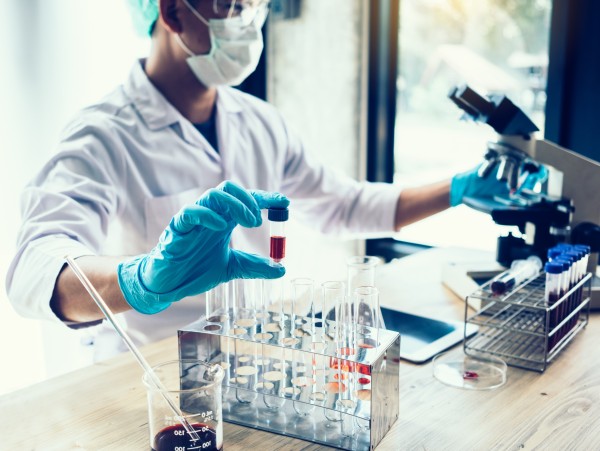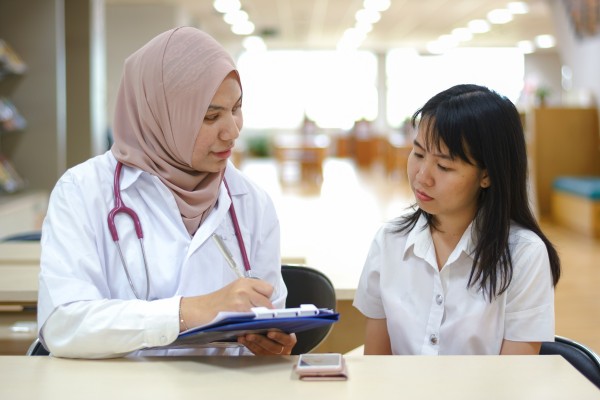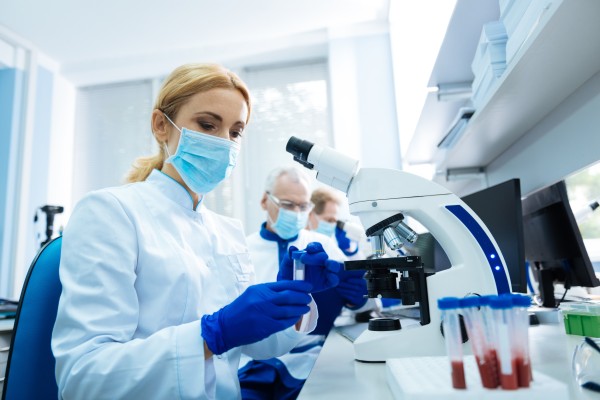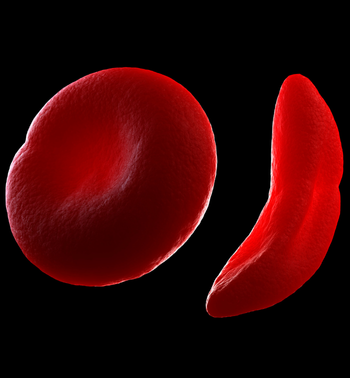The King’s College Denmark Hill Haematology (KCDHH) Biobank is located at the Rayne Institute and currently processes approximately 1,500 samples per year, which generates approximately 8,000 aliquots for research. We store viable cells and tissue components (mainly from bone marrow, blood and lymphoid tissue samples).
We collect samples from adult and paediatric patients with haematological diseases, including haematological cancers (including leukaemia, myeloma, lymphoproliferative and myeloproliferative disease), bone marrow failure syndromes (including aplastic anaemia, inherited bone marrow failure syndromes) and haemoglobinopathies (including sickle cell anaemia and thalassaemia). We also collect tissue samples from healthy individuals.
In November 2021, the KCDHH Biobank was granted ethical approval to re-establish the pre-existing King’s College London Haematology-Oncology Tissue Bank, introducing a new era of tissue banking for Haematology across King’s Health Partners (KHP). KCDHH focuses on biobanking samples collected from patients receiving their main clinical care at King’s College Hospital and referring hospitals, including material sent to the South East Haematological Malignancy Diagnostic Service (SE-HMDS) which are surplus to diagnostic requirements.
The KCDHH Biobank is open to all academic researchers in King's Health Partners and other academic or NHS institutions. We also consider applications for access to samples and clinical data from Industry when partnered with an academic researcher.
Biobank samples form a core resource for translational and discovery research across KHP Haematology. Our vision is for KHP to be an international powerhouse for Clinical Haematology and Translational Research in blood disease, to build on current excellence in delivery of clinical care, and remain at the forefront of innovation. The Haematology Biobank is a key part of this vision and our key objectives are:
- To facilitate translational research by providing quality samples annotated with accurate and relevant clinical data to advance our understanding of haematological disorders, within a robust governance framework;
- To promote collaborations in Haematology research across KHP and beyond.
Licence and ethics details
The KCDHH Biobank operates under REC approval 23/NE/0160 (Designated Individual (DI) Claire Troakes & the Human Tissue Authority (HTA) Licence Number 12293).
1. Governance Committee
The Governance Committee has overall responsibility for access, operations, compliance, audit and governance of the research biobank and meets at six-monthly intervals. Members of the Governance Committee include: the chair, clinical leads (myeloid/ lymphoid/ myeloma/ transplant and benign), SE-HMDS representative, histopathology representative, non-clinical scientific representatives, King's College London Head of Tissue Banking for Health Schools, biobank laboratory manager, biobank data manager, external expert representative (Consultant Haematologist external to KHP) and external lay representatives (up to three individuals).
2. Operational Sub-committee
The Operational Sub-committee advises on Biobank operation matters, and monitors compliance with HTA licence requirements, standardisation of laboratory procedures and quality assurance. This group meets every three months. Members of the Operational Sub-committee include: chair, clinical leads, biobank laboratory manager and biobank data manager.
3. Access Sub-committee
The Access Sub-committee is responsible for reviewing applications to access tissue and/or clinical data for research purposes. It meets every thre months, but ad hoc meetings for urgent sample requests may be arranged. Members of the Access Sub-committee include: chair, clinical leads, scientific representatives, external expert representative (Consultant Haematologist), biobank laboratory manager and biobank data manager.
What is a biobank?
A biobank is a collection of tissue samples donated by patients which are stored for use in research. Samples are taken during a medical procedure (such as a blood test or biopsy) and are analysed by scientists to find better ways to diagnose, prevent and treat cancers and other blood disorders in the future. Samples donated are classed as ‘extra material’ and are not needed for diagnosis or treatment.
How to participate
We would like to invite patients with blood disease to participate in biobanking whenever it is appropriate, during their clinical journey. Patients who attend hospital for investigation or follow up of a suspected or known haematological disease will be invited through letter, text or e-mail, from a biobank representative (a clinician, specialist nurse or research nurse) to discuss research biobanking in person, by telephone or video call. If you would like to participate in biobanking but have not yet been approached, please ask your healthcare provider at your next appointment.
Some patients may be invited to donate to the biobank at their clinic appointment. Patients may also be invited to donate at the same clinical encounter where the sample is being collected for clinical reasons, provided that sufficient time is provided for the patient to fully understand information about the biobank and to provide fully informed consent. You can find a copy of the Patient Information Sheet and consent form on the King's College London Biobank website, under the Governance and Access tab..
Samples collected, storage and use
The King’s College Denmark Hill Haematology (KCDHH) biobank focuses on collecting samples from patients receiving their main clinical care at King’s College Hospital (KCH) and referring hospitals, including material sent to the South East Haematological Malignancy Diagnostic Service (SE-HMDS) which are surplus to diagnostic requirements. Samples are stored in liquid nitrogen tanks and freezers at the Rayne Institute, Denmark Hill.
We collect samples from adult and paediatric patients with haematological diseases, including but not exclusively, haematological cancers (including leukaemia, myeloma, lymphoproliferative and myeloproliferative disease), bone marrow failure syndromes (including aplastic anaemia, inherited bone marrow failure syndromes) and haemoglobinopathies (including sickle cell anaemia and thalassaemia). We also collect tissue samples from healthy individuals as these can be useful as ‘controls’ in research. You can find a copy of the healthy donor information sheet here.
Donated samples will be used for studies that add to our knowledge about disease initiation, progression or treatment. Studies may involve:
- The use of large numbers of tissue samples collected from different patients (e.g. to discover biomarkers or other biological characteristics of a disease)
- Samples collected from a cohort of patients at multiple time points during the course of disease and treatment (e.g. to discover changes to the disease during and after treatment, or to find out why diseases develop resistance to treatments)
Patient data
The biobank will collect patients’ demographic and clinical data, including laboratory test results and details of treatments received by patients. Patient details and clinical data are logged on secure databases by designated and trained members of the Biobank team. Each patient is allocated a unique Biobank Patient ID which is then used to identify the patient in the first and any future encounters. Any patient data that is subsequently provided to researchers is fully anonymised. Personal identifiable information is never released to researchers. Read more about how your data will be used.
Benefits
Whilst donating samples to the biobank will not have any benefit to you directly, your samples will be used in research to improve our understanding of causes of Haematological disease, to discover and test potential new clinically useful diagnostic tests and new treatments with the aim of improving patient care in the future.
Current research projects using the biobank
We currently have several research groups from King’s College London (KCL) and KCH who have active projects with the biobank, researching the following disease areas: myelodysplastic syndromes, acute myeloid leukaemia, multiple myeloma, acute and chronic lymphocytic leukaemia, B-cell lymphoma and mantle cell lymphoma.
Feedback
For any queries or concerns, please email the biobank at kch-tr.
Who will have access to my data and how will it be handled?
Your data will be recorded on secure databases by designated and trained members of the biobank team. From time to time some data may be requested by researchers. Any patient data that is provided to researchers is fully anonymised. Personal identifiable information is never released to researchers.
Will donating samples to the biobank affect my treatment?
Donating samples to the biobank will not affect your treatment.
Will my genetic data be used by commercial companies?
It is possible that commercial companies may collaborate with King’s College London on genetic research projects. In these instances, your genetic data may be used by commercial companies, however it is important to remember that all samples released for research projects are fully anonymised.
Can I find out what research my samples have been used in?
Whilst we are unable to provide feedback on specific research studies your samples have been used in, the examples below will give you an insight into the sort of research your samples could be used in.
- Ectopic humanized mesenchymal niche in mice enables robust engraftment of myelodysplastic stem cells (2021)
- Gene-edited healthy donor CAR T cells show superior antitumour activity compared to CAR T cells derived from patients with lymphoma in an in vivo model of high-grade lymphoma (2021)
What happens to my samples after I die?
Your samples and data will still be made available to researchers after you die, but this is discussed when you choose to donate samples to ensure you make a fully informed decision.
Contact us
To contact the biobank, please email kch-tr.







